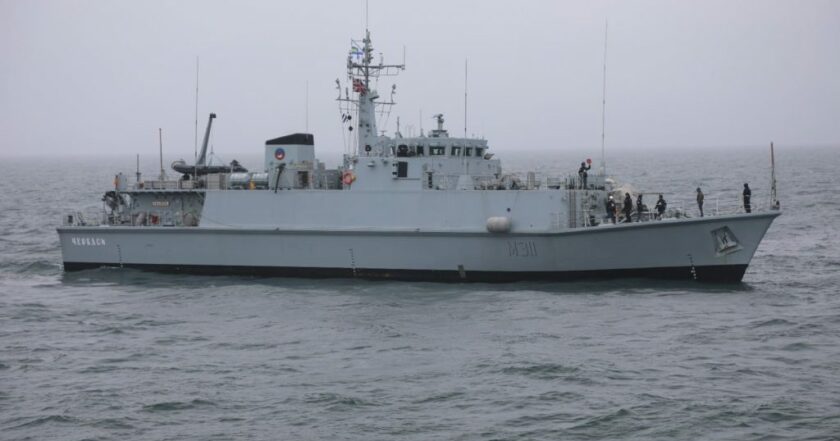Romania, Türkiye, and Bulgaria call for collaborative demining of the Black Sea

Sea minesweeper "Cherkasy" in the waters of Great Britain, October 23, 2023. Photo: Naval Forces of Ukraine
Bulgaria, Romania, and Türkiye want to involve other countries of the North Atlantic Alliance in demining the Black Sea
The Center for Transport Strategies reported this.
What is the problem?
It is worth noting that the Russian Federation uses the Black and Azov Seas for its military purposes. The Sea of Azov is entirely under the control of the Russian Federation.
Nevertheless, Russia's dominance in the Black Sea was reduced after the liberation of Snake Island.
However, after Moscow's withdrawal from the "grain agreement," civil shipping was again under threat. In addition to aerial missile attacks, Russia has been actively mining the Black Sea, which puts civilian ships at risk of detonation.
By the way, at the end of December, this is precisely what happened to a bulk carrier under the flag of Panama, which was on its way to one of the Danube ports to be loaded with grain. And this is not an isolated case.
According to the spokesman of the Navy of Ukraine's armed forces, Dmytro Pletenchuk, it is worth noting that the global demining operation may last for several years because even now, they are facing samples of weapons from the First and Second World Wars.
Demining trade routes will last three to five months. After all, this is very painstaking work that requires special trawlers and equipment, and it will be difficult for Ukraine to carry out this operation.
What is the solution?
Therefore, the three states of the North Atlantic Alliance, Türkiye, Romania, and Bulgaria, will sign an agreement on joint demining of their Black Sea waters in January.
As part of the "Triple Initiative" launched under the leadership of Türkiye against mine danger in the Black Sea, the 3rd round of the meeting of the Black Sea Mine Action Task Force was already held with the participation of delegations from Türkiye, Bulgaria, and Romania.
This demining operation will not be considered a NATO operation. Still, it will be the first significant joint action by the Black Sea allies since the start of Russia's full-scale war against Ukraine.
How does it work?
According to the head of the Bulgarian Ministry of Defense, they have been working on the issue of a relevant agreement since the end of summer 2023.
"We reached an agreement on the concept and text of the agreement – how to settle all issues, and next week my deputy will be in Istanbul for the signing, and soon this mission will begin," he said in a conversation with journalists in Blagoevgrad.
Tagarev also added that the war unleashed by Russia against Ukraine "leads to risks for our territory, for the safety of shipping."
"And to minimize these risks, the navies of three countries are also involved in demining, hopefully successfully," said the head of the Bulgarian Defense Ministry.
The countries plan to create a joint fleet dealing with mine clearance in parts of the Black Sea near Türkiye, Romania, and Bulgaria. Explosive munitions are getting there because of Russia's full-scale invasion of Ukraine.
They note that the initiative remains open for joint actions and participation of mine countermeasures forces and means of other NATO member countries located outside the Black Sea region.
The agreement between the three countries should be signed this week, namely on January 11, in Istanbul. The mission will begin soon after the signing of the agreement.
Thus, the anti-mine group will create safe conditions for the navigation of civilian ships in the Black Sea, minimizing the risk of explosions.
For reference:
Rubryka previously reported that Norway and Great Britain created a maritime coalition to support Ukraine. They note that the new association will supply ships and other means of transport to the Ukrainian defenders for conducting combat operations at sea.
In this regard, Great Britain, within the framework of the new naval coalition, was to hand over two minesweepers to Ukraine. However, Türkiye, citing a convention that straits it controls must be closed to warships of warring parties, said it would not let them through.




















































